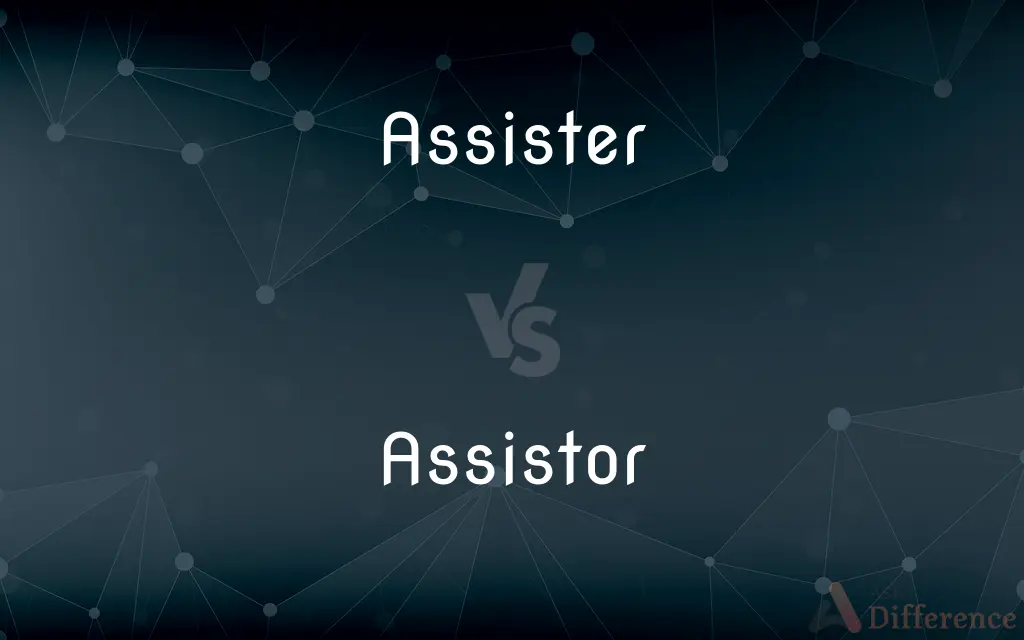Assister vs. Assistor — What's the Difference?
By Maham Liaqat & Urooj Arif — Updated on March 29, 2024
An assister is someone who provides help or support, commonly used in general contexts, while an assistor is less commonly used but can refer to devices or mechanisms aiding a process.

Difference Between Assister and Assistor
Table of Contents
ADVERTISEMENT
Key Differences
An assister is a term broadly used to describe a person who aids, supports, or helps someone else in any number of tasks or challenges. It emphasizes the role of support and assistance in human interactions and is applicable in various scenarios, from sports to personal support. On the other hand, an assistor, while also denoting support or help, is less commonly used and often refers to devices, mechanisms, or sometimes software that assists in a process. The term is more specialized and may be found in technical or specific professional contexts.
The primary difference between the two lies in their usage and connotation. "Assister" is more human-centric, focusing on the personal aspect of assistance. It captures the essence of human aid and support in a broad spectrum of activities. Conversely, "assistor" leans towards a more impersonal or mechanical assistance. It is often associated with tools or aids that facilitate a task or process, suggesting a non-human element in the support provided.
Despite these differences, both terms share the core concept of providing assistance. The choice between them depends on the context and the nature of the support being referred to, whether it is personal and human or technical and mechanical.
The distinction also reflects in language use and preference, with "assister" being the more commonly accepted and used term in everyday language, while "assistor" might be preferred in specific fields or for emphasizing non-human assistance.
Comparison Chart
Definition
Someone who provides help or support.
A device or mechanism providing assistance.
ADVERTISEMENT
Usage
Broad, applicable in various human contexts.
More specialized, often technical contexts.
Connotation
Human-centric, emphasizes personal aid.
Impersonal, suggests mechanical aid.
Commonality
More commonly used term.
Less commonly used term.
Example
Person helping another with tasks.
A tool or device aiding in a process.
Compare with Definitions
Assister
One who provides assistance in a non-professional capacity.
Volunteers acted as assisters at the event.
Assistor
An auxiliary tool or equipment.
The hydraulic assistor made lifting the heavy objects easier.
Assister
A helper or supporter in various contexts.
He was grateful for his sister’s role as an assister.
Assistor
A mechanism that facilitates an action.
The device is an essential assistor in the laboratory.
Assister
A person who helps or lends support.
The teacher’s assister helped organize the classroom.
Assistor
A non-human entity aiding in operations.
The robotic arm was an effective assistor in the assembly line.
Assister
An individual contributing to the ease of a process.
As an assister, her guidance was invaluable.
Assistor
A device designed to aid a process.
The software served as an assistor in analyzing the data.
Assister
Someone aiding in accomplishing a task.
The nurse acted as an assister during the procedure.
Assistor
Software or a system providing support.
The app acts as an assistor for managing daily tasks.
Assister
To give help or support to, especially as a subordinate or supplement; aid
The clerk assisted the judge by looking up related precedents. Her breathing was assisted by a respirator.
Assistor
(legal) assister
Assister
To give aid or support
Who assisted during the operation?.
Assistor
A assister.
Assister
To be present, as at a conference
"Mr. Dick had regularly assisted at our councils, with a meditative and sage demeanor. He never made a suggestion but once" (Charles Dickens).
Assister
The act of giving aid; help
Cleaned the garage with the assist of a friend.
Assister
A fielding and throwing of a baseball in such a way that enables a teammate to put out a runner.
Assister
A pass, as in basketball or ice hockey, that enables the receiver to score.
Assister
A mechanical device providing aid.
Assister
One who assists; an assistant or helper.
Assister
An assistant; a helper.
Common Curiosities
Is the term assister or assistor more commonly used?
"Assister" is more commonly used and recognized in everyday language.
Can an assistor be a person?
While less common, the term can be used for people in specific, often technical, contexts.
How does an assistor differ from an assister?
An assistor typically refers to a device or mechanism that aids a process, unlike an assister, which is usually a person.
Can software be considered an assistor?
Yes, software that provides support or aids a process can be termed an assistor.
What contexts are appropriate for using the term assistor?
"Assistor" is suitable for technical, mechanical, or software-related contexts.
Are there professional roles focused entirely on being an assister?
Yes, various professional roles, like assistants or support staff, focus on providing help.
Can an assistor replace human assistance?
In some tasks, particularly technical ones, an assistor can replace or augment human assistance.
What is an assister?
An assister is someone who provides help or support in various contexts.
How can one become a better assister?
Improving communication skills and understanding the needs of those you're supporting can make one a better assister.
Can the use of an assistor improve efficiency?
Absolutely, assistors, especially in technical contexts, can significantly improve efficiency and accuracy.
What makes someone an effective assister?
Effective assisters are those who provide timely, helpful support tailored to specific needs.
Do assisters always work in a support role?
Yes, assisters typically work in roles that support others, either directly or indirectly.
How has the role of assistors changed with technology?
Technology has expanded the concept of assistors to include digital and automated systems aiding humans.
What's the future of assistors in the workplace?
The future likely holds a greater integration of human and mechanical/electronic assistors to enhance productivity and innovation.
What are examples of assistors in technology?
Automated software tools, diagnostic equipment, and smart devices are examples of technology assistors.
Share Your Discovery

Previous Comparison
Port vs. Muscat
Next Comparison
Destress vs. DistressAuthor Spotlight
Written by
Maham LiaqatCo-written by
Urooj ArifUrooj is a skilled content writer at Ask Difference, known for her exceptional ability to simplify complex topics into engaging and informative content. With a passion for research and a flair for clear, concise writing, she consistently delivers articles that resonate with our diverse audience.
















































